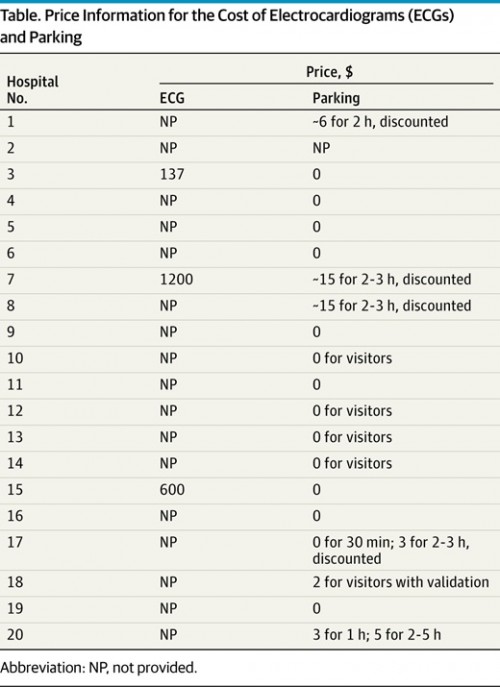It’s a study I wish I’d done myself. “Availability of Consumer Prices From Philadelphia Area Hospitals for Common Services“:
Most people in the United States are shielded by third-party payers from the marginal cost of their health care consumption. It has been suggested that removing that shield would foment concern about price and, in turn, create market pressure to keep prices down.
Nevertheless, however concerned about prices they may be, consumers cannot act on their concerns if prices are not easily available. This point was raised by Rosenthal et al,1 who attempted to find the price for hip replacement and discovered that “many health care providers cannot provide reasonable price estimates.”
Still, it may be incorrect to extrapolate the findings of Rosenthal et al to all health care because hip replacement is a complex service. The price of a hip replacement may not be known in advance because costs are higher if a special implant will be needed or if the patient requires a prolonged hospital stay. Furthermore, even if hospitals know their typical cost, they may find it unwise to offer hip replacements at that figure. Owing to information asymmetry, hospitals selling hip replacements to all comers at their typical cost might find themselves inundated with patients who suspect that their own costs will be higher.
It also may be the case that hospitals are ill equipped to answer questions about price over the telephone
To test these hypotheses, the methods of Rosenthal et al were used with a variation. We telephoned and asked whether price information could be obtained for an electrocardiogram (ECG)—a procedure with uniform costs and free of adverse selection. Next, we telephoned and asked whether price information could be obtained for the cost of parking at the hospital. The provision of parking prices would suggest that hospitals can indeed answer telephone queries about costs—when they want to.
When I read the above, I imagined the last paragraph in a very sarcastic tone. I suggest you do the same. Anyway, they called up 20 hospitals and asked them the prices for parking and an ECG. In each case, they declared that they were uninsured and would be paying in cash. Here are the results:
It turns out that hospitals are completely capable of reporting prices over the phone. Ninety-five percent of facilities could tell you the price of parking. Only 15%, however, could give you the price of an ECG. The prices ranged from $137 to $1200. I have no idea how such a variance could be justified.
They also seemed to offer free or discounted parking almost all of the time. So they can be sensitive to consumer demand. Just, apparently, not for actual care.


